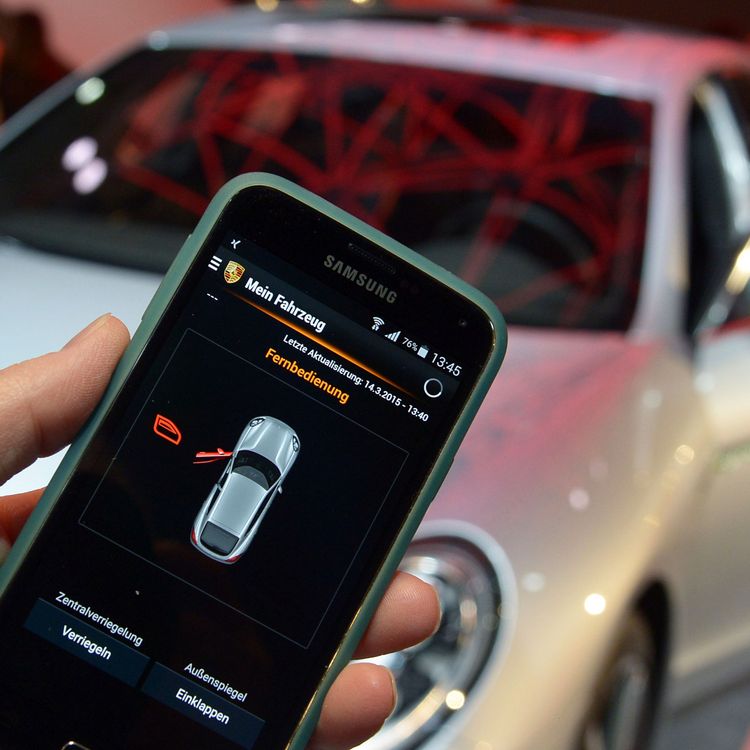Share

Babbage from The Economist
Babbage: 5G to unite them all
•
The fifth generation of mobile network promises to take us one step closer to wireless paradise and researchers infect patients with modified viruses to fight cancer
More episodes
View all episodes

Rocket man: Elon Musk’s plan to put people on Mars
40:14|President Donald Trump has announced that he wants to send Americans to plant the Stars and Stripes on Mars. The only rocket which currently stands any chance of making that happen is the enormous spacecraft being developed by Elon Musk, one of the president’s new advisors. Mr Musk has pledged to send uncrewed missions to Mars by the end of 2026, ahead of the first astronauts in early 2029—just before President Trump is supposed to leave office. But many challenges remain. Will his company, SpaceX, be able to make its Starship rocket work in time? Host: Alok Jha, The Economist’s science and technology editor, with senior editor Oliver Morton. Contributors: Peter Hague, an astrophysicist who writes the “Planetocracy” blog; Volker Maiwald an engineer at the German Aerospace Centre.For more on this topic, check out an episode from last year which examined Starship’s role in the US-China Moon race. Also, as an Economist subscriber, listen to our recent episode of “Checks and Balance” which asks whether Elon Musk is remaking America’s government or breaking it.Transcripts of our podcasts are available via economist.com/podcasts.Listen to what matters most, from global politics and business to science and technology—subscribe to Economist Podcasts+.For more information about how to access Economist Podcasts+, please visit our FAQs page or watch our video explaining how to link your account.
Humanity 2.0: the rise of the superhuman
44:59|From drugs to gene editing and brain implants, modern biotechnology has the potential to make humans stronger, more intelligent and perhaps even live longer. These ideas have largely existed at the fringes of scientific research, however, championed by eccentric billionaires whose aims include evading death. But investment and interest in human enhancement is growing—and some of those billionaires have now reached the heart of political power in America. How can human enhancement research be brought into the mainstream, so that it could one day benefit everyone?Host: Alok Jha, The Economist’s science and technology editor, with health editor Natasha Loder. Contributors: Aron D'Souza of the Enhanced Games; Charles Brenner of City of Hope National Medical Center; Arthur Caplan of New York University Grossman School of Medicine; and Bryan Johnson, a tech entrepreneur and self-declared “rejuvenation athlete”.If you enjoyed this, listen to The Weekend Intelligence’s episode on human growth hormone. How far would you go in the pursuit of perfection? Transcripts of our podcasts are available via economist.com/podcasts.Listen to what matters most, from global politics and business to science and technology—subscribe to Economist Podcasts+.For more information about how to access Economist Podcasts+, please visit our FAQs page or watch our video explaining how to link your account.
Going viral: could infections cause Alzheimer’s?
40:39|Alzheimer’s disease affects more than 30 million people around the world and there is no cure. For decades, research on the neurological condition has been focused on proteins known as amyloid and tau, which build up in the brains of people and prevent neurons from functioning properly. But treatments that focus on flushing those proteins out of the brain have so far proved underwhelming. A growing number of scientists, however, have a radical alternative theory. What if a virus is to blame? What if infections are the triggers that cause the build-up of amyloid and tau in the first place? Host: Alok Jha, The Economist’s science and technology editor, with data and science correspondent Ainslie Johnstone. Contributors: Ruth Itzhaki of the University of Oxford; Pascal Geldsetzer of Stanford University; and John Hardy of University College London.Transcripts of our podcasts are available via economist.com/podcasts.Listen to what matters most, from global politics and business to science and technology—subscribe to Economist Podcasts+.For more information about how to access Economist Podcasts+, please visit our FAQs page or watch our video explaining how to link your account.
Geoffrey Hinton: AI is more human than you think
37:50|Geoffrey Hinton is one of the “godfathers” of artificial intelligence, critical in the development of deep learning, backpropagation and much more. In 2024 he was awarded the Nobel prize in physics in recognition of his immense contributions to the field of computer science. Not bad for someone who started his career with the aim of understanding the human brain. Despite his role in its creation, though, Professor Hinton has been surprised by the rapid development of the technology. He’s now convinced that artificial neural networks can think, reason and understand the world in a way that could eventually be superior to our own brains.Professor Hinton joins Alok Jha, The Economist’s science and technology editor, to discuss why he thinks artificial intelligence is much more human than it seems. For more on this topic, check out our series on the science that built the AI revolution. We’d also recommend the most recent episode of The Weekend Intelligence, which investigated the role of the human data-labellers who made deep learning possible.Transcripts of our podcasts are available via economist.com/podcasts.Listen to what matters most, from global politics and business to science and technology—subscribe to Economist Podcasts+.For more information about how to access Economist Podcasts+, please visit our FAQs page or watch our video explaining how to link your account.
The Large(r) Hadron Collider: what’s next for the world’s biggest experiment?
35:48|In 2012 scientists at the Large Hadron Collider (LHC) at CERN in Geneva found the Higgs boson. Things have been quiet since then on the “epic discovery” front—but that doesn’t mean the thousands of physicists working there have been idle. The collider is undergoing a years-long upgrade to make it even more powerful, so that it can probe even deeper into the fabric of our reality. When the LHC is eventually reborn as the “High-Luminosity LHC” by the end of the decade, it will begin a new chapter of discovery. We speak to the incoming boss of CERN to find out if the machine will finally lift the veil on the “new physics” that scientists have been searching for for decades.Alok Jha, The Economist’s science and technology editor, travels to the LHC at CERN in Geneva, where he meets the next director-general Mark Thomson, plus many of the scientists and engineers who are working on the LHC’s big upgrade. Transcripts of our podcasts are available via economist.com/podcasts.Listen to what matters most, from global politics and business to science and technology—subscribe to Economist Podcasts+.For more information about how to access Economist Podcasts+, please visit our FAQs page or watch our video explaining how to link your account.
Designing babies: is there any future for gene-edited embryos?
43:01|The world was shocked in 2018 when He Jiankui, a Chinese biophysicist, announced that he had helped to produce two girls whose genetic code he had edited when they had been embryos. His aim had been to tweak a gene that sometimes confers protection against HIV infections. No one had ever used the CRISPR gene-editing tool in reproduction before and it was completely untested in embryos. Scientists around the world condemned the work as wildly premature and possibly dangerous—the Chinese authorities agreed and Dr He was imprisoned for three years. Now, more than six years later, Dr He is back. And he still wants to prevent medical conditions by editing human embryos. But will the world ever be ready for this use of gene editing? Or will newer methods of editing human genes prove more promising?Host: Alok Jha, The Economist’s science and technology editor. Contributors: Emilie Steinmark, science correspondent at The Economist; Chinese researcher He Jiankui; Henry (Hank) Greely of the Stanford Centre for Biomedical Ethics; Panicos Shangaris of King's College Hospital.Transcripts of our podcasts are available via economist.com/podcasts.Listen to what matters most, from global politics and business to science and technology—subscribe to Economist Podcasts+.For more information about how to access Economist Podcasts+, please visit our FAQs page or watch our video explaining how to link your account.
Ruff translation, part two: could AI decode animal communication?
39:34|Translation is tricky business—not least when your subject belongs to a different species. But as evidence mounts that many animals are capable of rich, complex communication, scientists are trying to bridge the inter-species gap. Already, artificial intelligence has proved a valuable tool. But one ambitious technologist is trying to take these models even further. Could his new initiative one day allow humans to speak to their fellow animals? And what else might people learn in the process?Host: Kenneth Cukier, The Economist’s deputy executive editor. Contributors: Denise Herzing, founder of the Wild Dolphin Project; Aza Raskin, co-founder of the Earth Species Project, and The Economist’s Abby Bertics.Transcripts of our podcasts are available via economist.com/podcasts.Listen to what matters most, from global politics and business to science and technology—subscribe to Economist Podcasts+.For more information about how to access Economist Podcasts+, please visit our FAQs page or watch our video explaining how to link your account.
Ruff translation, part one: do animals have language?
44:17|Talking to animals has long been a human fantasy. But what is the nature of animal communication—and how does chirping and barking differ from human language? This is the first episode in a two-part series about animal communication and whether it could be translated in the age of AI. We meet a researcher who is leading the largest animal communication study ever attempted, and we ask whether language is a cognitive ability that’s unique to humans, or just one of many modes of communication dotted across the tree of life. Host: Kenneth Cukier, The Economist’s deputy executive editor. Contributors: Robert Berwick of the Massachusetts Institute of Technology; Federico Rossano of the University of California, San Diego; and The Economist’s Abby Bertics.Transcripts of our podcasts are available via economist.com/podcasts.Listen to what matters most, from global politics and business to science and technology—subscribe to Economist Podcasts+.For more information about how to access Economist Podcasts+, please visit our FAQs page or watch our video explaining how to link your account.
Trailer: Scam Inc
03:47|A sophisticated, predatory, multi-billion dollar industry is emerging from the shadows. It already rivals the size of the illicit drug trade. And it’s about to get bigger and much more powerful. The Economist’s Sue-Lin Wong follows a trail that starts with the collapse of a bank in rural Kansas to uncover a global, underground scam economy built around human trafficking, corruption and money laundering. Can it be stopped?Available now.To listen to the full series subscribe to Economist Podcasts+.